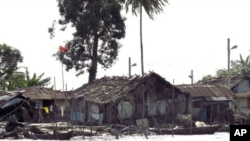Elections in Nigeria cut the ruling party's share of powerful state governors. But President Goodluck Jonathan's party retains control of most of the oil-rich Niger Delta where it is promising to follow through with an amnesty program for former militants.
Nigeria's gubernatorial elections changed the shape of state government with opposition parties now controlling all six states in the southwest and the ruling party picking up control of the biggest state in the north.
With one gubernatorial race still to be decided, the ruling party's overall share of state governorships has dropped. But the party has kept control of most of the oil-rich Niger Delta as President Jonathan won a full four-year term as the first Nigerian president from the Delta.
Ruling People's Democratic Party member Joseph Ovie says President Jonathan's popularity helped the party hold on to local governments in the Delta. "PDP is on the ground in Delta State. And that is the party we voted for. And we know that by the special grace of God the whole thing has gone through," Ovie said.
As vice president, Jonathan helped arrange an amnesty for Niger Delta militants, whose attacks against the region's oil infrastructure dropped Nigerian crude exports to record lows.
Since that amnesty, the main militant group has claimed responsibility for a series of bombings, including Independence Day blasts in the capital that killed 12 people.
Delta militants say the federal government has failed to invest in a region that produces the bulk of the country's foreign-exchange earnings.
Opposition politician Solomon Aganbi says the ruling party's failures gave Delta challengers their best opportunity since Nigeria's 1999 return to democracy.
"For the past 12 years there is no potable water, no food, no security, and no hospital. But yet they have allocations. What is the allocation going for? PDP government has disappointed for the past 12 years. That is why we want to remove them. But here we failed," he said.
Aganbi says the ruling party's showing in the Delta is partly a result of electoral fraud.
"This is not one man, one vote. It is one man, 20 votes,” Aganbi explained. “One local government area with a population less than 20,000 came out with 60,000 votes."
Voters in four districts of Imo state go back to the polls Friday because electoral officials say April's first round of voting failed to produce a clear winner with the opposition candidate slightly ahead of the ruling party incumbent.
The Action Congress of Nigeria party is contesting the gubernatorial vote in Akwa Ibom state.
Nigeria's Ruling Party Still Strong in Oil-Rich Niger Delta








